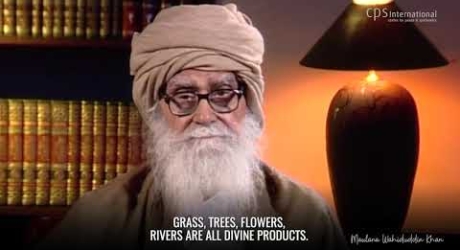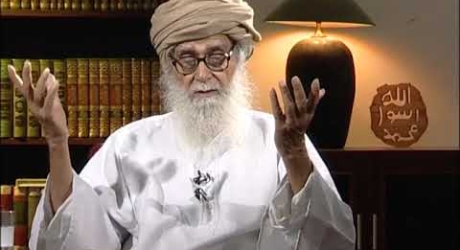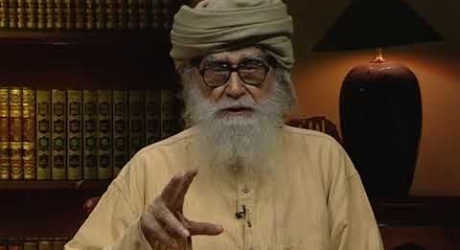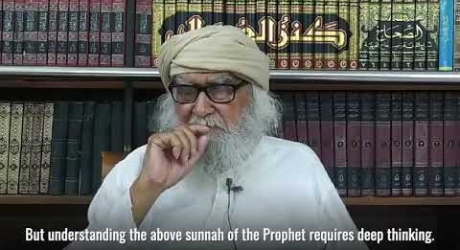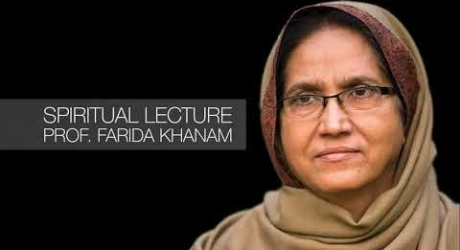The concept of meditation in Islam is based on two things, at-tafakkur wat-tadabbur (thinking and contemplation) (3: 191, 4: 82). Abu Darda was a senior Companion of the Prophet, after his death a man came to his wife and asked her what was the most important form of worship performed by Abu Darda. She replied: “He would spend the whole day thinking, thinking, thinking”. According to this, Islamic meditation is a thinking process rather than the cessation of intellectual activity. The Quran further tells us that this intellectual process has two different directions—al-anfus and al-afaq. Al-anfus literally means soul, that is, inner world; afaq literally means universe, that is, external world. So when a believer sees the universe functioning in a perfect manner and he finds that all the events in this vast universe always proceed towards a meaningful result, he realizes that man’s life too must have a meaningful end. This makes him exclaim:
O our Lord! You have not created all this without purpose. Glory be to you! Give us salvation in the life to come. (3: 191)
According to a hadith report, the Prophet of Islam is reported to have said: Man yuridillahu bihi khayran yufaqqihu fi ad-din. (Bukhari) That is, “For whom God wishes good, He gives him deeper understanding of religion.”
Deep thinking is a great blessing from God. This hadith report tells us that God gives deep thinking to him whom He decides to bless with goodness.
Most people take things at face value. They do not think deeply about matters. They see things only very superficially. Deep thinking means to pass through external conditions and situations and to ponder deeply on them, trying to see what underlies the surface. It is to think seriously about the various aspects of a situation and to discover what lessons one can learn from them. It is to extract meaning from these aspects for one’s life. In this way, one is able to arrive at the core of an issue, at its reality, and once this happens, one will not deviate.
This is the deep understanding that emerges from serious thinking and reflecting. It relates to both religious as well as secular affairs.
In this world, if you want to walk on the right path, you need to engage in this kind of deep thinking. Taking things at face value will take you nowhere.
You will get the blessing of deep thinking when you have prepared yourself to receive inspiration from God; when you have developed a close relationship with God; when you have developed your mind through reflection and contemplation; when you have made yourself a container of inspirations sent down by God. Only in this way can your thinking be inspired thinking. Without inspiration from God, you cannot develop deep thinking.
To develop deep understanding of things, you need to mould your life on the lines of the life of the Prophet. The Prophet devoted his whole life to dawah. He led a very simple life. He pondered on the Quran and on the universe.
This is also a practice of the Prophet that we should emulate. Only then can we develop deep understanding of things and take proper decisions.
When the Prophet arrived at Hudaybiyyah, and was met with stiff opposition from his Makkan opponents, the external situation appeared to be heavily loaded against him. But he was able to see the opportunities that lay hidden in the midst of these external circumstances. At the external level, the peace treaty that he entered into with his opponents meant that he and his companions had to return to Madinah without being able to proceed to Makkah to perform the Umrah or ‘minor pilgrimage’. But he understood that if peace were established, there could be greater interaction between Muslims and others. They could meet each other freely, and then others could learn about Islam. Islam could address their minds.
So, on the face of it, the Prophet’s decision, as per the conditions insisted on by his opponents, to return with his companions to Madinah without being able to go to Makkah was going back to where he and his followers had set out from. But in actual fact, it was a glorious entry for the Prophet into Makkah—because that is precisely what happened not long after.
This is an example of deep thinking.
Consider another example of deep thinking from the life of the Prophet. When he was in Makkah, where he preached Islam for 13 years, the Prophet had to face tremendous opposition and persecution. But, instead of fighting with his opponents (in which case many of his followers might have been killed), he decided to shift to Madinah and engage in dawah there.
This is an instance of great wisdom. The Prophet did not confront and fight against his Makkan opponents. Instead, he quietly left for Madinah, where he planned his dawah mission afresh. And that led to a new dawn, with the rapid spread of Islam after this.
This was a result of deep understanding or tafaqquh.
Fiqh or tafaqquh have the same meaning as hikmat, or wisdom. The Quran, for example, says: “He grants wisdom to whom He will; and whoever is granted wisdom has indeed been granted abundant wealth.” (2:269)
The words that appear in the Quran and Hadith in the sense of tafaqquh are not about issues of jurisprudence, or what in the terminology of Islamic jurisprudence is called fiqhi masail. Rather, it is in the sense of wisdom or deep understanding about life. These days, generally people think that tafaqquh is all about expertise in fiqhi masail. But this is not what is meant here. Tafaqquh in this context is definitely not a call for people to become experts in fiqhi masail. That is a different issue. Here, tafaqquh means deep thinking about issues related to life and of religion.
If one follows the model of the Prophet, one develops the ability of engaging in deep understanding of issues, of faith and life, or what is referred to in the above hadith report as tafaqquh fi ad-din. In this way, one will be evolve in such a way that one will be able to take a proper decision in all matters.
According to the same hadith report, the Prophet is then reported to have said: “This group (true Muslims) will strictly adhere to God’s teachings and will not be harmed by any one following a different path till God’s order is established (on the Day of Judgment).” This means that there will never come a time when an oppressor overpowers the Muslim community.
What relation does this portion of the hadith have with tafaqquh, given that both matters appear in the same hadith reported from the Prophet?
This means that no enemy group will ever become dominant over the Muslim ummah. But there is a condition for this—and that is, that the ummah should possess the quality of tafaqquh. This does not indicate the fazilat, or superiority, of the Muslim ummah over others. What it means is that if the Muslim ummah possesses true faith, true tafaqquh, it will be capable of thinking in a Divinely-inspired way. It will be able to understand things on the basis of deep thinking, and then its efforts will succeed. It will not take any foolish steps that will lead oppressors to dominate it.
So, what this hadith indicates is not the superiority of the Muslim ummah, but, rather, the virtue and value of action based on deep wisdom.
Today, all across the world, Muslims are living in complaint. They complain that others are oppressing them. They claim that others are engaging in conspiracies against them. They rant and rave against people whom they brand as ‘enemies of Islam’. All these allegations are false. From this hadith report one learns that Muslims have lost deep understanding. They have lost deep wisdom. And they are paying the price of all this. And so, wherever and whenever Muslims face the problems that they label as ‘oppression’, they should think that they have lost wisdom and deep understanding.
This hadith tells us something very important. And that is, that if you follow the model of the Prophet, you will develop deep understanding and wise thinking. And then, if you face a situation where you feel that someone whom you consider your oppressor has overpowered you, you must not think that this has happened because of this person’s oppression. The cause for this state of affairs will always be inside you. It will be found to be related to your lack of deep thinking, to your lack of deep understanding, to your lack of proper planning.
So, this hadith report provides us with a very valuable lesson—for individuals, in their personal lives, and at the collective level, too, for the whole ummah.
Earlier, reference was made to fiqhi masail or jurisprudential issues. They relate to the external form of Islam. They are not real essence of Islam. The real essence of Islam lies in the spirit. Till deep understanding remains among Muslims, they will remain established in the spirit of Islam. And when this deep understanding is lost, there will only be found among them the form of Islam. If the ummah adheres to only the external forms of Islam, it clearly indicates that it has lost deep understanding. And if it is established in the spirit of Islam, then it still retains deep thinking and wisdom.
Deep thinking or wisdom is the highest good. The highest good is not to become materially very rich, to own a big building, to have a massive bank balance or to form one’s own government and become the ruler of a country. This is not the highest good. The highest good is to cultivate deep understanding.
It is instructive to note that the things that people ordinarily think are the highest good are the negation of the above hadith. Many people think that plenty of money, a big house, political power and so on are big things, but actually this is not so. What are indeed big things are deep thinking, understanding and wisdom, because through these you develop intellectually and spiritually.
People wrongly imagine that material things, power and fame are big things and that acquiring them will give them happiness. This, however, is self-styled thinking. According to this hadith report, developing wisdom and deep thinking is a big thing. The biggest thing in God’s eyes is wisdom, not material wealth or political power or other such things. Whenever a group establishes its dominance over the ummah, you should know that the ummah has lost deep thinking, its wisdom. If you possess wisdom, no one can become dominant over you.
People fight with each other over material wealth or for political power. But this is against God’s scheme. If you want to live according to God’s scheme, then do that which helps you gain deep understanding and wisdom. This is truly a big thing. This hadith report gives us a very important lesson. It is full of deep wisdom. It shows us what the biggest thing in life is. It indicates to us what it is that we should strive for. And that is wisdom. It tells us that the big thing for which we should work is deep understanding, of both religion and worldly affairs, and that this is goodness for us. This deep understanding encompasses all things amidst which we lead our lives—our personal life, our family life, our social life, our cultural life, our national life, and every other sphere of life.
If you have deep thinking, all your affairs will fall into place. And without deep thinking, none of your affairs will turn out properly. Deep thinking will help you understand life, manage your affairs well, develop the dawah spirit and save yourself from the negative activities of others.
This hadith is very small in terms of length, but what it tells us is something that is very big indeed.
May God bless us to live with deep understanding.






